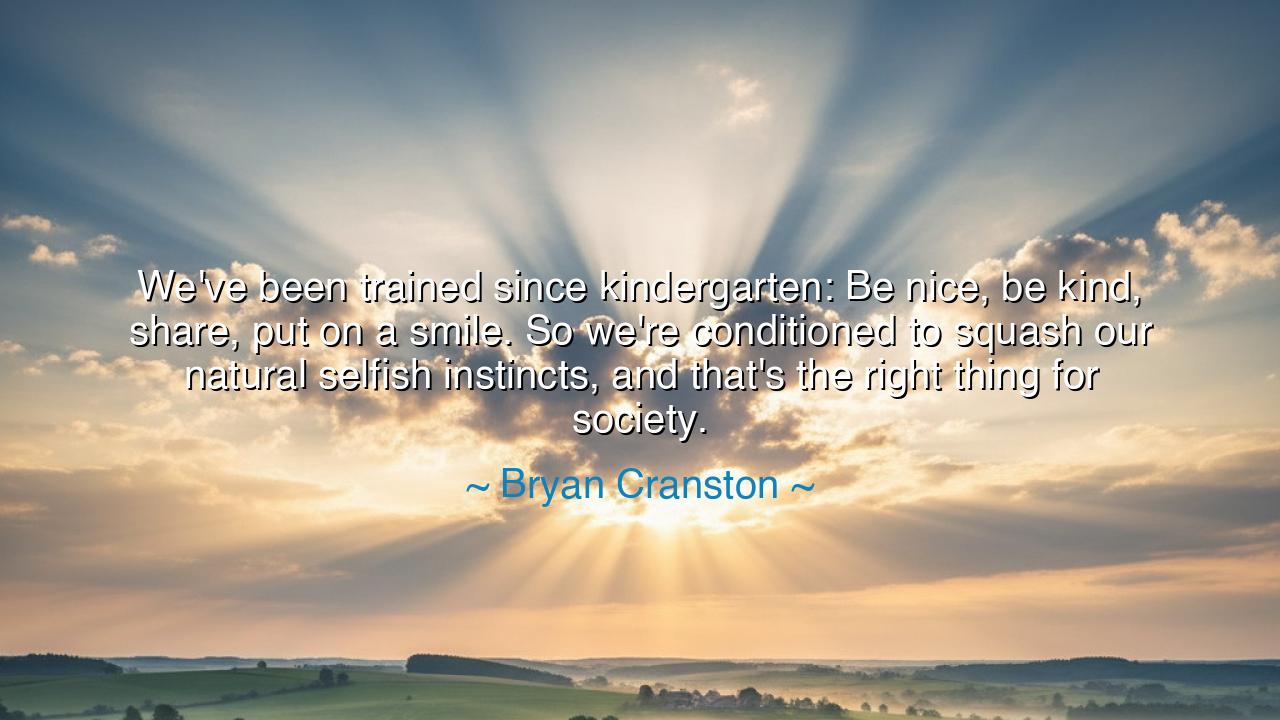
We've been trained since kindergarten: Be nice, be kind, share
We've been trained since kindergarten: Be nice, be kind, share, put on a smile. So we're conditioned to squash our natural selfish instincts, and that's the right thing for society.






Hear the words of Bryan Cranston: “We’ve been trained since kindergarten: Be nice, be kind, share, put on a smile. So we’re conditioned to squash our natural selfish instincts, and that’s the right thing for society.” These words strike at the heart of civilization itself. For human beings are not born into harmony; they are born with instincts of hunger, desire, and self-preservation. Yet from the earliest years, the community impresses upon the child the ways of cooperation: to share, to be kind, to wear the smile of goodwill even when instinct whispers otherwise. In this tension between nature and nurture lies the very foundation of society.
The ancients knew this truth well. Plato, in his Republic, spoke of the necessity of shaping the young through stories, songs, and discipline, lest they grow wild and destructive. To squash selfish instincts is not to deny our humanity but to refine it, to shape it into a form fit for the common good. Cranston’s words echo this wisdom: what begins in the lessons of kindergarten—“be nice, share your toys”—is in fact the training ground for citizenship, for brotherhood, for the very possibility of peace.
Consider the tale of Lycurgus, lawgiver of Sparta. He saw that untempered instincts bred chaos, envy, and ruin, so he set forth laws that required citizens to eat together, to train together, to share all things in common. In this way, he forced the people to look beyond themselves and to see their lives as bound to one another. Harsh though it was, it created strength, discipline, and unity. And so too in our gentler age, the simple acts of kindness taught to children serve the same purpose: to remind us that we are not alone, and that our lives flourish only when bound together.
Yet Cranston also points to the smile, and this is no small thing. For while kindness and sharing are actions, the smile is a symbol, an outward expression of inward harmony. It is not always born of sincerity—it is often trained, as he admits—but in its practice, it can soften hearts, build bridges, and ease tensions. The ancients knew the value of appearances; Cicero taught that demeanor was as crucial as deeds in sustaining the republic. The trained smile, then, becomes both shield and bridge, a small gesture that sustains the greater work of community.
Still, one must not mistake this training as hypocrisy. To restrain selfishness and to perform kindness, even when the heart resists, is the first step toward true virtue. Aristotle wrote that by practicing good habits, even without feeling them, we eventually shape our souls to embody them sincerely. So it is with the lessons of childhood: to be nice, to share, to smile—though at first learned as discipline—these become, over time, part of our character, until kindness flows not from training alone, but from the heart.
The lesson for us is this: do not despise the conditioning of goodness, even when it feels artificial. For society endures because people choose restraint over instinct, generosity over greed, harmony over conflict. If every man and woman gave themselves fully to selfishness, the bonds of community would collapse, and life would become, as Hobbes said, “nasty, brutish, and short.” The training of kindness, begun in childhood, is the seed of civilization itself.
So let this wisdom endure: cherish the lessons of youth. Be kind. Share. Smile. They are not trivial courtesies but the pillars of peace. Restrain your selfishness, not because it denies your nature, but because it elevates it. For in conquering selfish instinct, humanity finds its nobility, and in practicing kindness, it finds its strength. This is the way of all enduring societies, and it must be the way of ours.






AAdministratorAdministrator
Welcome, honored guests. Please leave a comment, we will respond soon